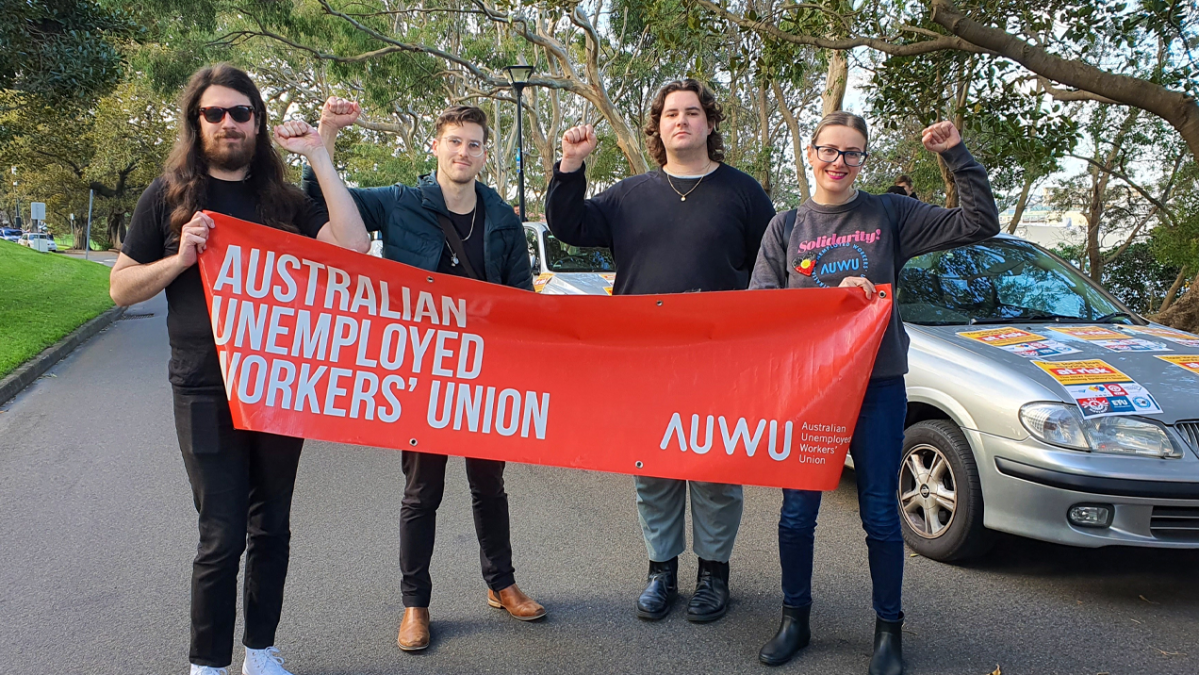
When Ashley* finally found a job she could do with her chronic illness, the 30-year-old writer thought her life was sorted. That was before the pandemic hit.
“One day in March all the work I had locked in for the rest of the year just disappeared,” she told PEDESTRIAN.TV.
“I immediately started emailing around to try to find similar work anywhere I could, but it was the same story everywhere.”
Like countless other Aussies suddenly thrust into the clusterfuck that is Centrelink, Ashley had trouble figuring out what she was entitled to, and how to get it. That’s when she decided to get in touch with the Australian Unemployed Workers Union (AUWU), a union which, yes, represents workers who don’t actually have jobs.
“Everyone’s a worker pretty much, we [as a society] just don’t value certain kinds of labour,” Kristin O’Connell from the AUWU told P.TV.
The AUWU came about in 2014 when its founding members realised accessing Centrelink was a complete mess. They started putting together guides and other material to help applicants out, and since then the movement’s grown into a 16,000-person strong union.
“You have received a new MyGov message” pic.twitter.com/x8mfEQhgcL
— AUWU (@AusUnemployment) May 29, 2020
And now, it’s needed more than ever. In August, Australia’s unemployment rate hit 7.5%, an increase from the two-decade high of 7.4% in July. That equates to more than one million Australians out of work.
The union’s campaigned for everything from a living wage for welfare recipients (which has been achieved, at least temporarily, thanks to the coronavirus supplement) as well as abolishing mutual obligations, which O’Connell describes as “a whole bunch of absolutely pointless, menial tasks that are very demeaning.”
Their number one piece of advice right now, according to O’Connell, is that many mutual obligations are not actually obligatory during the pandemic.
Even though job providers are telling clients they have to apply for arbitrary amounts of random jobs or attend useless appointments, Employment Minister Michaelia Cash has herself announced this is no longer a requirement for accessing payments, at least while it is unsafe to do so.
Despite the advocacy, critics have slammed the AUWU, claiming the phrase “unemployed workers” is an oxymoron. Such comments ignore decades of labour history going as far back as the Great Depression.
“People do work every day in their community, and they do it without being paid,” O’Connell added.
Those draining and time-consuming mutual obligations, too, constitute labour, despite not being a traditional form of employment.
It might seem strange at first, but members of the AUWU are actually on strike right now.
At a time when it’s simply not safe to go out for non-essential reasons, unemployed workers are rallying against mutual obligations such as ‘work for the dole’ which the union says are predatory.
mornin strikers #MOstrike pic.twitter.com/dhYeuAeHxn
— AUWU (@AusUnemployment) August 16, 2020
“That is another way in which we are a real union, we have the power to withdraw our labor by changing job agency, which removes that revenue for that person from the agency they’ve left,” O’Connell said.
But there are still a few differences compared to the main unions: the AUWU doesn’t have membership fees (for obvious reasons) and is run entirely by volunteers.
With a surge in enquiries from the coronavirus pandemic, their advocacy and assistance is more important than ever.
“There’s just been mass confusion because the government’s repeatedly put out very misleading information,” O’Connell said.
Ashley was among that group, and she told P.TV the AUWU was what got her through it. Among other things, she was asked to dig up years-old documents she had no way of accessing and told to attend an in-person interview despite being in a high-risk category for COVID-19 due to her chronic illness.
He situation is not unique, either. Before the pandemic hit, over 40% of welfare recipients had an illness or disability that prevented them from working full-time, according to the government’s own statistics.
The AUWU has a hotline at 1800 AUWU4U (1800 289 848) where people can ask for advice and even be walked through the process of dealing with Centrelink.
“[The representative] calmly and compassionately answered all my questions, and provided the kind of support and guidance that I needed to get my application completed without having a breakdown,” Ashley said.
“The thing with the AUWU is that they all have been through it themselves. They understand this ridiculous system better than anyone else can, and they also understand how distressing it is to be in this position.
“Through the entire process, this AUWU rep was the only person who made me feel like they actually cared about me.”
*Name changed.



